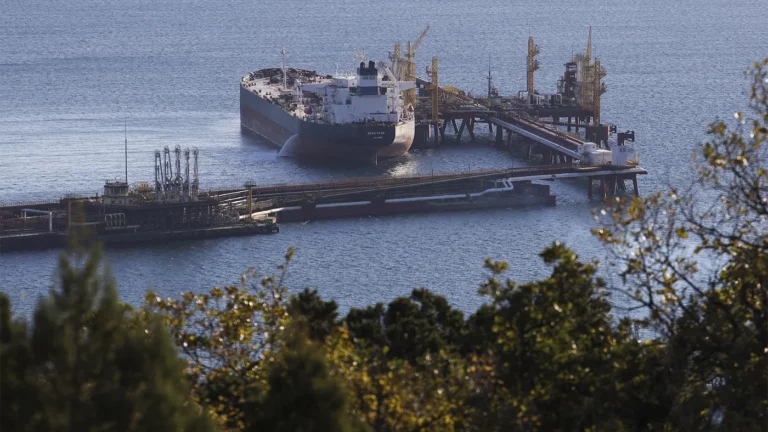
As anti-Russian sanctions tighten, Russia’s associated “ghost” fleet of at least 600 obsolete tankers continues to expand. On this subject writing Wednesday, March 1, CNN.
The TV channel notes that the “phantom tankers” are designed to facilitate the export of Russian oil in the face of tougher sanctions.
“Industry insiders estimate the size of this ‘ghost’ fleet at around 600 vessels, or about 10% of the world’s major tankers. And the numbers continue to grow,” CNN writes.
It is almost impossible to establish the ultimate owner of these tankers. According to oil and gas columnist Sergei Vakulenko, a researcher at the Carnegie Endowment, market players suspect that some of the companies these vessels are registered to have ties to “the Russian state or certain political actors”.
CNN notes that shell companies in Dubai or Hong Kong may be involved in buying tankers for the “ghost fleet.” “Some bought tankers from Europeans, others handed over old ships that might otherwise end up in a landfill,” the document said.
In particular, the European Union imposed sanctions at the end of February against Sun Ship Management, based in Dubai, on suspicion of helping Russia to circumvent restrictions on oil exports. Former publications investigative journalists Investigate Europe And United Reporters reported that several directors of this company were listed as senior executives and employees of Russia’s largest shipping company, Sovcomflot, or associated with its subsidiaries. The EU says Sun Ship Management “acted as one of the main companies managing and operating Russian oil shipping” and that “the Russian Federation is the ultimate beneficiary” of its operations.
The number of “phantom tankers” and the frequency of their use have increased as Moscow tries to avoid cooperation with Western shippers and actively redirects supplies to China and India, CNN notes. In turn, Beijing and New Delhi, which increased their imports of Russian raw materials in 2022, are crowding out customers in Europe, who are now prohibited from buying oil and petroleum products from Russia transported by sea.
The need to deliver oil to more distant locations forces a search for new vessels, as well as shipowners prepared to face additional complexities and legal risks, especially after the introduction of a Russian oil price cap , writes CNN. “You’re getting deeper and deeper into the dark arts,” said an executive at an oil trading firm, describing the activities of the “ghost fleet.”
According to EA Gibson, Russia now needs four times more resources to transport raw materials than before the start of military operations in Ukraine.
“In an effort to continue, the world’s second-largest crude oil exporter has changed decades-old trade patterns and split the world’s energy system in two,” CNN said.
“There’s a fleet that doesn’t do business with Russia at all, and there’s a fleet that almost exclusively does business with Russia,” said Richard Matthews, head of research at EA Gibson.
Matthew Wright, senior market analyst at Kpler, divides ships carrying Russian oil into two categories: “grey” and “dark.” According to him, the “gray” tankers were sold after the outbreak of hostilities in Ukraine – they were mainly bought from European owners of the company in the Middle East and Asia, who were not previously active in the tanker market .
In turn, the “dark” ships are a kind of “veterans” that allowed Iran and Venezuela to avoid sanctions, but have recently switched to carrying Russian oil. According to Wright, the activities of these tankers are often masked by disabling the AIS transponder, which allows them to determine their location.
An unnamed senior oil trading executive told CNN the “ghost fleet” is adding 25 to 35 tankers a month. Global Witness, a nonprofit, estimates that a quarter of oil delivery vessel sales between late February 2022 and January 2023 were made by unknown buyers, around double the amount in the same one-year period. earlier. CNN notes that demand could increase in the coming months if China needs more fuel to rebuild its economy.
Matthew Wright said the use of the “ghost fleet” increases costs for all oil traders, draining their capacity. The analyst pointed to a growing loss of productivity in the tanker market.
In turn, Richard Matthews drew attention to the growing risks of a major spill or accident due to the use of obsolete vessels. According to him, it is likely that the technical condition of these tankers is not maintained in accordance with the standards. CNN notes that the “ghost fleet” has a considerable number of ships that have been in service for more than 15 years.
The creation of a “shadow fleet” by Russia was reported by the media at the end of 2022 in the context of the introduction by Western countries of various restrictions on Russian energy resources.

